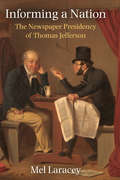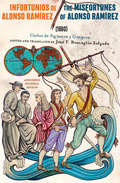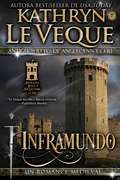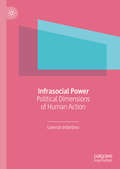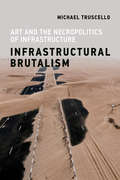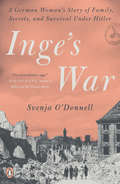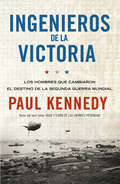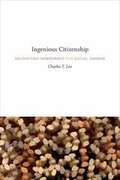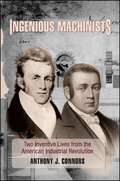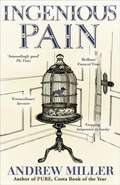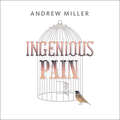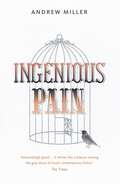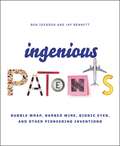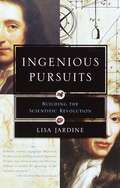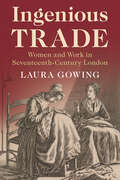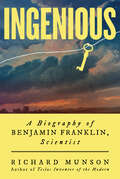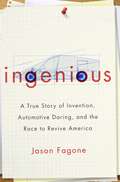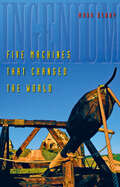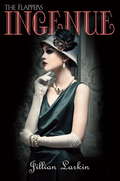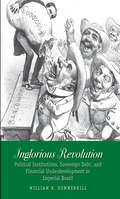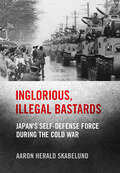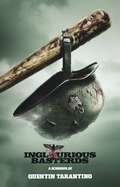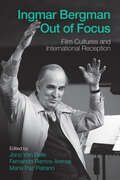- Table View
- List View
Informing a Nation: The Newspaper Presidency of Thomas Jefferson
by Melvin LaraceyDuring his presidency, Thomas Jefferson both sponsored and wrote for his own newspaper, the National Intelligencer and Washington Advertiser. The newspaper spoke on behalf of his policies and those of his Republican, anti-federalist party, the Democratic-Republicans, the precursor to today’s Democrats. Author Mel Laracey focuses on the newspaper’s message during Jefferson’s first term, showing how the third president used media to promote his administration and its goals against their political rivals, the Federalists. Informing a Nation shows how Jefferson and his allies dealt with political challenges, reveals hitherto unexamined aspects of the early presidency, and raises broad questions of the relationship between the presidency and media today.
Infortunios de Alonso Ramirez / The Misfortunes of Alonso Ramirez (1690): Annotated Bilingual Edition
by Carlos GongoraIn 2009, 319 years after its publication, and following over a century of copious scholarly speculation about the work, José F. Buscaglia is the first scholar to furnish direct and irrefutable proof that the story contained in the Infortunios/Misfortunes is based on the life and times of a man certifiably named Alonso Ramírez, who was shipwrecked on Herradura Point in the Coast of Yucatán on Sunday September 18, 1689. This first bilingual edition of the Infortunios/Misfortunes reports the findings of almost two decades of sustained research in pursuit, on land and by sea, of a most elusive historical character who was, as we now can attest with all degree of certainty, the first American known to have circumnavigated the globe. Captured by pirates, shipwrecked, and eventually rescued and sent on his way, this is one man’s story of his unanticipated voyage around the Early Modern world. With transcription, translation, notes, maps, images, and critical essay by Jose F. Buscaglia-Salgado, this Rutgers edition is the most complete and authoritative study on a work that grants us privileged access to the intricacies of early American subjectivity.
Inframundo
by Kathryn Le Veque1197 D.C. Tras la pérdida de su prometida, Sir Keller de Poyer ha aprendido a no confiar en las mujeres. Un hombre gigantesco con una mente brillante, Keller es socialmente torpe, pero un consumado caballero. Tanto, que su señor, William Marshal, le obsequia tierras en Gales por su meritorio servicio. Pero hay una trampa: para asegurar las tierras y los títulos, debe casarse con la heredera galesa.
Infrasocial Power: Political Dimensions of Human Action
by Lorenzo InfantinoBuilding from the level of individual interaction, this book intends to shed light on what the author terms "infrasocial power" and the relation between this individual-actor oriented level and public power. In overviewing the origins of power, the author allows for the disaggregation of the social fabric, thus making it possible to: 1) isolate the “sequence” in which the phenomenon of superordination and subordination materialises; 2) identify the institutional “instruments” which can be used to limit infrasocial power; 3) discriminate between a social position achieved through engagement with others (and what we are capable of doing for them) from one occupied by means of force and deception; 4) explain the birth and function of public power; and 5) analyze the consequences produced by different political regimes.
Infrastructural Brutalism: Art and the Necropolitics of Infrastructure (Infrastructures)
by Michael TruscelloHow "drowned town" literature, road movies, energy landscape photography, and "death train" narratives represent the brutality of industrial infrastructures. In this book, Michael Truscello looks at the industrial infrastructure not as an invisible system of connectivity and mobility that keeps capitalism humming in the background but as a manufactured miasma of despair, toxicity, and death. Truscello terms this "infrastructural brutalism"--a formulation that not only alludes to the historical nexus of infrastructure and the concrete aesthetic of Brutalist architecture but also describes the ecological, political, and psychological brutality of industrial infrastructures.
Inge's War: A German Woman's Story of Family, Secrets, and Survival Under Hitler
by Svenja O'Donnell"An extraordinary saga." --David Grann, New York Times bestselling author of Killers of the Flower Moon The mesmerizing account of a granddaughter's search for a World War II family history hidden for sixty yearsGrowing up in Paris as the daughter of a German mother and an Irish father, Svenja O'Donnell knew little of her family's German past. All she knew was that her great-grandparents, grandmother, and mother had fled their home city of Königsberg near the end of World War II, never to return. But everything changed when O'Donnell traveled to the city--now known as Kaliningrad, and a part of Russia--and called her grandmother, who uncharacteristically burst into tears. "I have so much to tell you," Inge said. In this transporting and illuminating book, the award-winning journalist vividly reconstructs the story of Inge's life from the rise of the Nazis through the brutal postwar years, from falling in love with a man who was sent to the Eastern Front just after she became pregnant with his child, to spearheading her family's flight as the Red Army closed in, her young daughter in tow. Ultimately, O'Donnell uncovers the act of violence that separated Inge from the man she loved; a terrible secret hidden for more than six decades. A captivating World War II saga, Inge's War is also a powerful reckoning with the meaning of German identity and inherited trauma. In retracing her grandmother's footsteps, O'Donnell not only discovers the remarkable story of a woman caught in the gears of history, but also comes face to face with her family's legacy of neutrality and inaction--and offers a rare glimpse into a reality too long buried by silence and shame.
Ingenieros de la victoria: Los hombres que cambiaron el destino de la Segunda Guerra Mundial
by Paul KennedyUna relato fascinante sobre la estrategia secreta que llevó a los Aliados a la victoria En enero de 1943, Franklin D. Roosevelt y Churchill se reunieron en Casablanca y establecieron los objetivos bélicos de los Aliados: controlar las rutas marítimas del Atlántico y las aéreas sobre Europa occidental y central, reforzar los bombardeos sobre Alemania, detener el avance del Frente del Este y terminar con el imperialismo japonés. Sorprendentemente, poco más de un año después, estos ambiciosos proyectos se habían consumado. A menudo la historia de la Segunda Guerra Mundial se ha narrado como una gran novela, como si hubiera sido librada por superhombres o determinada por el destino. Paul Kennedy revela cómo este plan estratégico fue ejecutado por soldados rasos, científicos, ingenieros y hombres de negocios que tuvieron la enorme responsabilidad de comprender y ejecutar los planes de éxito de sus altos mandos. Nos muestra quiénes fueron los verdaderos héroes de la guerra, y les otorga por primera vez el lugar que merecen en la historia. La crítica ha dicho... «Lectura imprescindible para los aficionados a la historia militar.» El Diario «Una importante contribución a nuestra comprensión de la Segunda Guerra Mundial.» Michael Beschloss, New York Times Book Review
Ingenious Citizenship: Recrafting Democracy for Social Change
by Charles T. LeeIn Ingenious Citizenship Charles T. Lee centers the daily experiences and actions of migrant domestic workers, sex workers, transgender people, and suicide bombers in his rethinking of mainstream models of social change. Bridging cultural and political theory with analyses of film, literature, and ethnographic sources, Lee shows how these abject populations find ingenious and improvisational ways to disrupt and appropriate practices of liberal citizenship. When voting and other forms of civic engagement are unavailable or ineffective, the subversive acts of a domestic worker breaking a dish or a prostitute using the strategies and language of an entrepreneur challenge the accepted norms of political action. Taken to the extreme, a young Palestinian woman blowing herself up in a Jerusalem supermarket questions two of liberal citizenship's most cherished values: life and liberty. Using these examples to critically reinterpret political agency, citizenship practices, and social transformation, Lee reveals the limits of organizing change around a human rights discourse. Moreover, his subjects offer crucial lessons in how to turn even the worst conditions and the most unstable positions in society into footholds for transformative and democratic agency.
Ingenious Machinists: Two Inventive Lives from the American Industrial Revolution (Excelsior Editions)
by Anthony J. ConnorsIngenious Machinists recounts the early development of industrialization in New England and New York through the lives of two prominent innovators whose work advanced the transformation to factory work and corporations, the rise of the middle class, and other momentous changes in nineteenth-century America. Paul Moody chose a secure path as a corporate engineer in the Waltham-Lowell system that both rewarded and constrained his career. David Wilkinson was a risk-taking entrepreneur from Rhode Island who went bankrupt and relocated to Cohoes, New York, where he was instrumental in that city's early industrial development. Anthony J. Connors writes not just a history of technological innovation and business development, but also two interwoven stories about these inventors. He shows the textile industry not in its decline, but in its days of great social and economic promise. It is a story of the social consequences of new technology and the risks and rewards of the exhilarating, but unsettling, early years of industrial capitalism.
Ingenious Pain
by Andrew MillerAt the dawn of the Enlightenment, James Dyer is born unable to feel pain. A source of wonder and scientific curiosity as a child, he rises through the ranks of Georgian society to become a brilliant surgeon. Yet as a human being he fails, for he can no more feel love and compassion than pain. Until, en route to St Petersburg to inoculate the Empress Catherine against smallpox, he meets his nemesis and saviour. Note: British punctuation and spelling.
Ingenious Pain
by Andrew MillerThe extraordinary prize-winning debut from Andrew Miller. Winner of the IMPAC Award and James Tait Black Memorial Prize.At the dawn of the Enlightenment, James Dyer is born unable to feel pain. A source of wonder and scientific curiosity as a child, he rises through the ranks of Georgian society to become a brilliant surgeon. Yet as a human being he fails, for he can no more feel love and compassion than pain. Until, en route to St Petersburg to inoculate the Empress Catherine against smallpox, he meets his nemesis and saviour.(P)2019 Hodder & Stoughton Limited
Ingenious Pain: Winner of the James Tait Black Memorial Prize
by Andrew MillerThe extraordinary prize-winning debut from Andrew Miller. Winner of the IMPAC Award and James Tait Black Memorial Prize.At the dawn of the Enlightenment, James Dyer is born unable to feel pain. A source of wonder and scientific curiosity as a child, he rises through the ranks of Georgian society to become a brilliant surgeon. Yet as a human being he fails, for he can no more feel love and compassion than pain. Until, en route to St Petersburg to inoculate the Empress Catherine against smallpox, he meets his nemesis and saviour.
Ingenious Pain: Winner of the James Tait Black Memorial Prize
by Andrew Miller'ONE OF OUR MOST SKILFUL CHRONICLERS OF THE HUMAN HEART AND MIND' Sunday TimesWinner of the James Tait Black Memorial Prize and the International Dublin Literary Award'Astoundingly good'The Times'Brilliant'Financial Times'Engrossing'Guardian'Dazzling'Observer'Timeless'SpectatorThe extraordinary prize-winning debut from Andrew Miller - a highly imaginative, atmospheric first novelAt the dawn of the Enlightenment, a man is born unable to feel pain. A source of wonder and scientific curiosity as a child, he rises through the ranks of Georgian society to become a brilliant surgeon. Yet as a human being he fails, for he can no more feel love and compassion than pain. Until, en route to St Petersburg to inoculate the Empress Catherine, he meets his nemesis and saviour.PRAISE FOR ANDREW MILLER'His writing is a source of wonder and delight'Hilary Mantel'A writer of very rare and outstanding gifts'Independent on Sunday'A highly intelligent writer, both exciting and contemplative'The Times'Unique, visionary, a master at unmasking humanity'Sarah Hall'A wonderful storyteller'Spectator
Ingenious Patents: Bubblewrap, Bottlecaps, Barbed Wire, And Other Pioneering Inventions
by Jay Bennett Ben IkensonFor the curious and the creators, Ingenious Patents tells the fascinating history of the inventors and their creations that have changed our world.Discover some of the most innovative of the 6.5 million patents that the U.S. Patent and Trademark Office has granted since Thomas Jefferson issued the first one in 1790. Revised and reformatted from the original 2004 edition, Ingenious Patents presents each device along with background about the inventor, interesting sidebars and history, and an excerpt from the original patent application. Author Jay Bennet has also written 15 new entries, everything from iPhones to 3G wireless to CRISPR gene editing. Liberally sprinkled throughout are patent diagrams created by the inventors annotated to show exactly how each item works.Entries include creative commercial successes in fields as diverse as medicine, aeronautics, computing, agriculture, and consumer goods. Readers are certain to find a topic of interest here, whether it is the history behind the patent for a Pez dispenser, cathode ray tube, kitty litter, DNA fingerprinting, or the design of a Fender Stratocaster guitar.
Ingenious Pursuits: Building The Scientific Revolution
by Lisa JardineIn this fascinating look at the European scientific advances of the seventeenth and early eighteenth centuries, historian Lisa Jardine demonstrates that the pursuit of knowledge occurs not in isolation, but rather in the lively interplay and frequently cutthroat competition between creative minds. The great thinkers of that extraordinary age, including Isaac Newton, Johannes Kepler, and Christopher Wren, are shown in the context in which they lived and worked. We learn of the correspondences they kept with their equally passionate colleagues and come to understand the unique collaborative climate that fostered virtuoso discoveries in the areas of medicine, astronomy, mathematics, biology, chemistry, botany, geography, and engineering. Ingenious Pursuits brilliantly chronicles the true intellectual revolution that continues to shape our very understanding of ourselves, and of the world around us.
Ingenious Trade: Women and Work in Seventeenth-Century London
by Laura GowingIngenious Trade recovers the intricate stories of the young women who came to London in the late seventeenth century to earn their own living, most often with the needle, and the mistresses who set up shops and supervised their apprenticeships. Tracking women through city archives, it reveals the extent and complexity of their contracts, training and skills, from adolescence to old age. In contrast to the informal, unstructured and marginalised aspects of women's work, this book uses legal records and guild archives to reconstruct women's negotiations with city regulations and bureaucracy. It shows single women, wives and widows establishing themselves in guilds both alongside and separate to men, in a network that extended from elites to paupers and around the country. Through an intensive and creative archival reconstruction, Laura Gowing recovers the significance of apprenticeship in the lives of girls and women, and puts women's work at the heart of the revolution in worldly goods.
Ingenious: A Biography of Benjamin Franklin, Scientist
by Richard MunsonThe dramatic story of an ingenious man who explained nature and created a country. Benjamin Franklin was one of the preeminent scientists of his time. Driven by curiosity, he conducted cutting-edge research on electricity, heat, ocean currents, weather patterns, chemical bonds, and plants. But today, Franklin is remembered more for his political prowess and diplomatic achievements than his scientific creativity. In this incisive and rich account of Benjamin Franklin’s life and career, Richard Munson recovers this vital part of Franklin’s story, reveals his modern relevance, and offers a compelling portrait of a shrewd experimenter, clever innovator, and visionary physicist whose fame opened doors to negotiate French support and funding for American independence. Munson’s riveting narrative explores how science underpins Franklin’s entire story—from tradesman to inventor to nation-founder—and argues that Franklin’s political life cannot be understood without giving proper credit to his scientific accomplishments.
Ingenious: A True Story of Invention, Automotive Daring, and the Race to Revive America
by Jason FagoneAn epic tale of invention, in which ordinary people's lives are changed forever by their quest to engineer a radically new kind of car In 2007, the X Prize Foundation announced that it would give $10 million to anyone who could build a safe, mass-producible car that could travel 100 miles on the energy equivalent of a gallon of gas. The challenge attracted more than one hundred teams from all over the world, including dozens of amateurs. Many designed their cars entirely from scratch, rejecting decades of thinking about what a car should look like. Jason Fagone follows four of those teams from the build stage to the final race and beyond--into a world in which destiny hangs on a low drag coefficient and a lug nut can be a beautiful talisman. The result is a gripping story of crazy collaboration, absurd risks, colossal hopes, and poignant losses. In an old pole barn in central Illinois, childhood sweethearts hack together an electric-powered dreamboat, using scavenged parts, forging their own steel, and burning through their life savings. In Virginia, an impassioned entrepreneur and his hand-picked squad of speed freaks pool their imaginations and build a car so light that you can push it across the floor with your thumb. In West Philly, a group of disaffected high school students come into their own as they create a hybrid car with the engine of a Harley motorcycle. And in Southern California, the early favorite--a start-up backed by millions in venture capital--designs a car that looks like an alien egg. Ingenious is a joyride. Fagone takes us into the garages and the minds of the inventors, capturing the fractious yet beautiful process of engineering a bespoke machine. Suspenseful and bighearted, this is the story of ordinary people risking failure, economic ruin, and ridicule to create something vital that Detroit had never pulled off. As the Illinois team wrote in chalk on the wall of their barn, "SOMEBODY HAS TO DO SOMETHING. THAT SOMEBODY IS US."
Ingenium: Five Machines That Changed the World
by Mark DennyIngenium is medieval English vernacular for "an ingenious contrivance." In this fascinating book, physicist Mark Denny considers five such contrivances—the bow and arrow, the waterwheel, the counterpoise siege engine (including the trebuchet), the pendulum clock anchor escapement, and the centrifugal governor—and demonstrates how they literally changed the world. Interweaving an entertaining narrative with diagrams, equations, and drawings, Denny shares the history of each device, explains the physics behind it, and describes how it was used, how it evolved, and why it is significant in today's world. Consider the bow and arrow, which transformed warfare by allowing soldiers to attack their enemies at a safe distance. Or the waterwheel, which enabled Old World civilizations to grind grain, pump water, and power machines during a period of extreme labor shortages. Medieval warriors engaged in an early form of biological warfare by using the trebuchet to launch dead animals or plague-ridden corpses over enormous fortress walls. The pendulum clock forever enslaved modern humans to the clock by linking the accurate measure of time to the burdens of schedules, deadlines, promptness, and tardiness. And the centrifugal governor gave rise to an entire branch of modern engineering science: feedback control.Reflecting on the inventors of these ancient machines and the times in which they lived, Denny concludes with thought-provoking observations about inventors, inventiveness, genius, and innovation. Whether you dream of making a better mousetrap or launching pumpkins into the stratosphere, Ingenium will tickle your fancy.
Ingenue
by Jillian LarkinPower . . . love . . . scandal . . . There's never enough to go around. In the city that never sleeps, Lorraine Dyer is wide awake. Ever since she exposed Clara Knowles for the tramp she was--and lost her closest confidante in the process--Lorraine has spent every second scheming to make her selfish, lovesick ex-best friend pay for what she did. No one crosses Lorraine. Not even Gloria. True love conquers everything--or so Gloria Carmody crazily believed. She and Jerome Johnson can barely scrape together cash for their rent, let alone have a moment to whisper sweet nothings in the dark. And if they thought escaping Chicago meant they'd get away with murder . . . they were dead wrong. Clara was sure that once handsome, charming Marcus Eastman discovered her shameful secret, he'd drop her like a bad habit. Instead, he swept her off her feet and whisked her away to New York. Being with Marcus is a breath of fresh air--and a chance for Clara to leave her wild flapper ways firmly in the past. Except the dazzling parties and bright lights won't stop whispering her name. . . . INGENUE is the second novel in the sexy, dangerous, and ridiculously romantic Flappers series set in the Roaring Twenties . . . where revenge is a dish best served cold.From the Hardcover edition.
Inglorious Revolution
by William R. SummerhillNineteenth-century Brazil's constitutional monarchy credibly committed to repay sovereign debt, borrowing repeatedly in international and domestic capital markets without default. Yet it failed to lay the institutional foundations that private financial markets needed to thrive. This study shows why sovereign creditworthiness did not necessarily translate into financial development. "Using a vast array of archival evidence, Summerhill convincingly shows that political commitment to a secure public debt was neither necessary nor sufficient to insure financial development in nineteenth-century Brazil. A must-read for economic and financial historians and for anyone interested in the politics of financial development." --Jean-Laurent Rosenthal, California Institute of Technology
Inglorious Royal Marriages
by Leslie CarrollIt's no secret that the marriages of monarchs are often made in hell. Here are some of the most spectacular mismatches in five hundred years of royal history.... In a world where many kings, queens, and princes lacked nothing but true love, marital mismatches could bring out the baddest, boldest behavior in the bluest of bloodlines. Margaret Tudor, her niece Mary I, and Catherine of Braganza were desperately in love with chronically unfaithful husbands, but at least they weren't murdered by them, as were two of the Medici princesses were. King Charles II's beautiful, high-spirited sister "Minette" wed Louis XIV's younger brother, who wore more makeup and perfume than she did. Forced to wed her boring, jug-eared cousin Ferdinand, Marie of Roumania--a granddaughter of Queen Victoria--proved herself one of the heroines of World War I by using her prodigious personal charm to regain massive amounts of land during the peace talks at Versailles. Brimming with outrageous real-life stories of royal marriages gone wrong, this is an entertaining, unforgettable book of dubious matches doomed from the start.
Inglorious, Illegal Bastards: Japan's Self-Defense Force during the Cold War (Studies of the Weatherhead East Asian Institute, Columbia University)
by Aaron SkabelundIn Inglorious, Illegal Bastards, Aaron Herald Skabelund examines how the Self-Defense Force (SDF)—the post–World War II Japanese military—and specifically the Ground Self-Defense Force (GSDF), struggled for legitimacy in a society at best indifferent to them and often hostile to their very existence.From the early iterations of the GSDF as the Police Reserve Force and the National Safety Force, through its establishment as the largest and most visible branch of the armed forces, the GSDF deployed an array of public outreach and public service initiatives, including off-base and on-base events, civil engineering projects, and natural disaster relief operations. Internally, the GSDF focused on indoctrination of its personnel to fashion a reconfigured patriotism and esprit de corps. These efforts to gain legitimacy achieved some success and influenced the public over time, but they did not just change society. They also transformed the force itself, as it assumed new priorities and traditions and contributed to the making of a Cold War defense identity, which came to be shared by wider society in Japan. As Inglorious, Illegal Bastards demonstrates, this identity endures today, several decades after the end of the Cold War.
Inglourious Basterds: A Screenplay
by Quentin TarantinoFrom the most original and beloved screenwriter of his generation, the complete Oscar-nominated screenplay of Quentin Tarantino's World War II epic Inglorious Basterds. From the brilliant writer/director behind the iconic films Pulp Fiction, Kill Bill, and Once Upon a Time in Hollywood, comes Tarantino's most ambitious movie: a World War II epic starring Brad Pitt and filmed on location in Germany and France. The action tale follows the parallel story of a guerrilla-like squad of American soldiers called "The Basterds" and the French Jewish teenage girl Shosanna who find themselves behind enemy Nazi lines during the German occupation. When the Inglourious Basterds encounter Shosanna at a propaganda screening at the movie house she runs, they conspire to launch an unexpected plot to end the war. Pitt plays Lieutenant Aldo Raine -- the leader of the Basterds. Raine is an illiterate hillbilly from the mountains of Tennessee who puts together a team of eight Jewish-American soldiers to hunt down the Nazis. Filled with Tarantino's trademark electric dialogue and thrilling action sequences, Inglourious Basterds is one of the most celebrated films of the twenty-first century.
Ingmar Bergman Out of Focus: Film Cultures and International Reception
by Jono Van Belle, Fernando Ramos Arenas, and María Paz PeiranoDirector Ingmar Bergman occupies a central place in the history of modern cinema. Credited with igniting a cinematic revolution, his ability to produce work which resonated with audiences globally has brought scholarly attention to the impact of Bergman’s Swedish background on his oeuvre. Ingmar Bergman Out of Focus revises this question of Bergman’s “familiarity” to produce a more expansive understanding of Bergman’s cultural heritage. Considering the impact of Bergman’s films on film festival organizers, critics, academics, and audiences all over the world, this volume illuminates how Bergman’s film aesthetics simultaneously shaped modern culture and were themselves reshaped by the debates and concerns that preoccupied his viewers.
